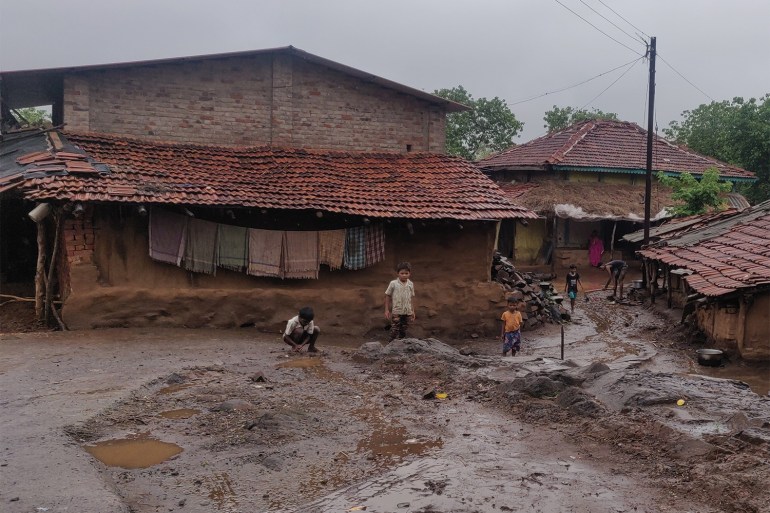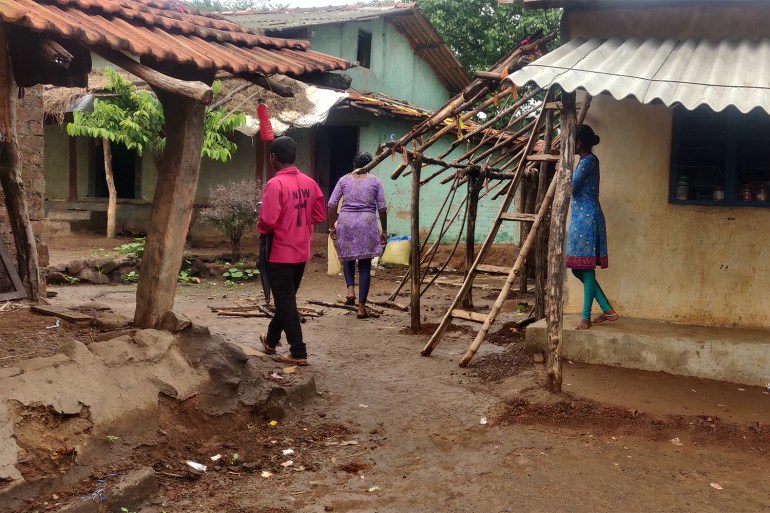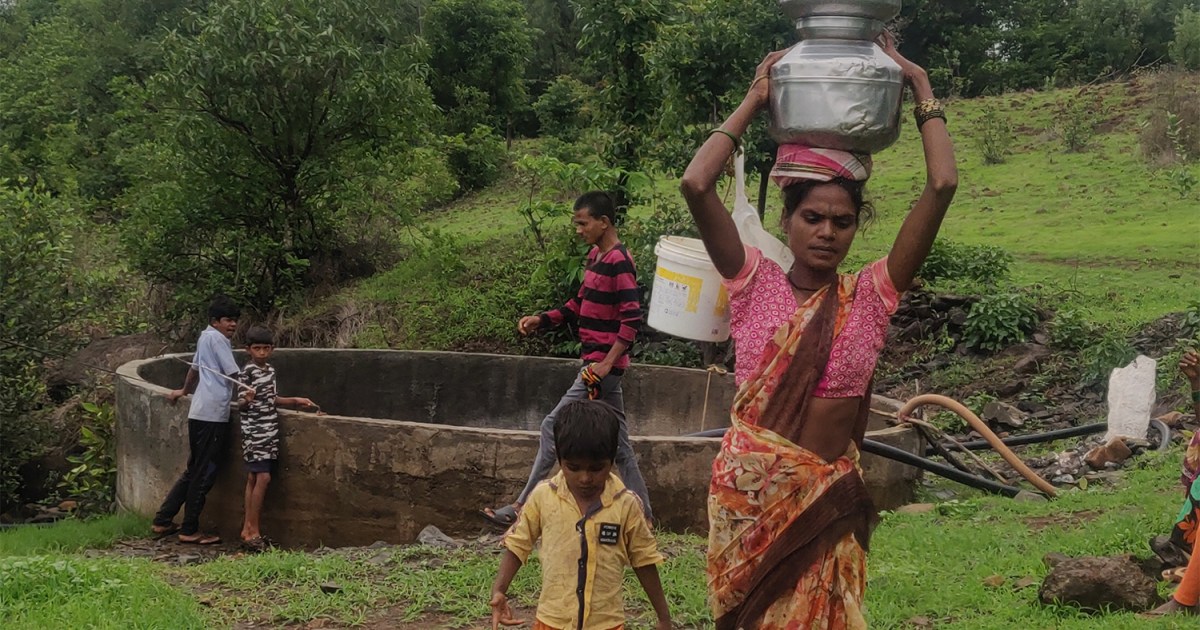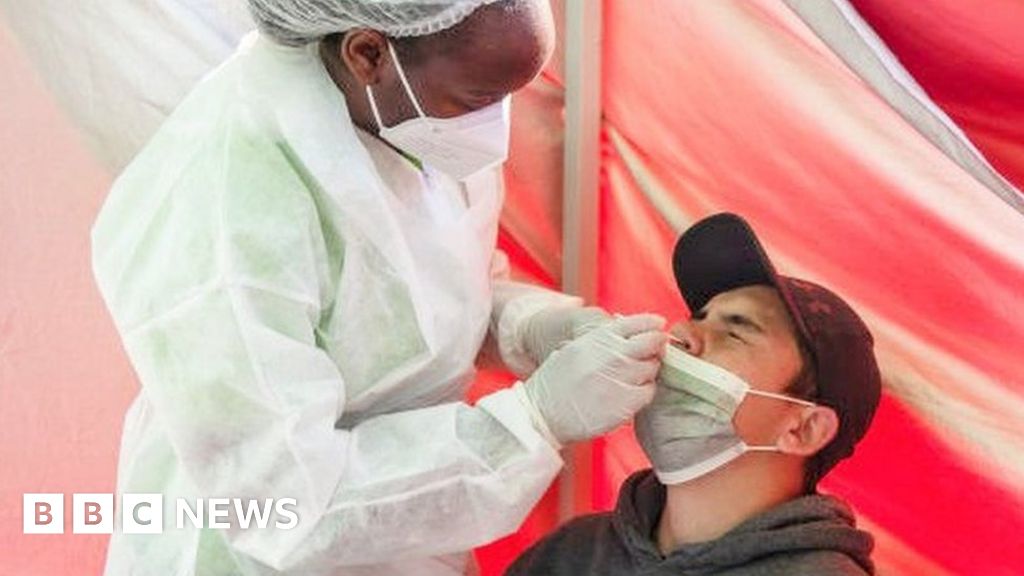Nashik, India – Two years in the past, Leela Pardhi was rappelling down a 60 feet-deep (18 metres) effectively to fetch water when the rope holding her slipped and he or she fell into the effectively, badly injuring her legs and hips. She remains to be in ache.
That harmful descent was the one method the 29-year-old discover may discover water within the hamlet of Bardechi Wadi, in Trimbakeshwar in western India’s Maharashtra state.
“I thank God that I solely fell from additional down the effectively and never from the highest. I could not have survived,” Leela instructed Al Jazeera.
She needed to see a physician who prescribed her medicine, important prices for a household that lives off a meagre farming earnings of lower than 50,000 rupees ($674) a yr.
Two years later, and despite the hazard, Leela’s mother-in-law Jaibai and 12-year-old daughter Varsha nonetheless descend the effectively to fetch water for his or her household.
Leela’s household consists of her 30-year-old husband Sanjay, who’s a farmer, their two youngsters aged 12 and eight, and her in-laws.
 Girls and women of Bardechi Wadi in Maharashtra state’s Nashik district[Tanvi Deshpande/Al Jazeera]
Girls and women of Bardechi Wadi in Maharashtra state’s Nashik district[Tanvi Deshpande/Al Jazeera]For about 5 months of summer time yearly, girls belonging to the Thakur caste, one in every of Maharashtra’s scheduled castes that most individuals within the hamlet belong to, rappel down this effectively and spend hours ready for water to seep into the ditches on the backside.
They want the water for each day home wants, together with consuming.
In drought-struck communities like Bardechi Wadi, fetching water is taken into account a girl’s accountability, with the thankless burden affecting their well being and financial standing and leaving them weak to systemic exploitation.
In Bardewadi, Nashik, tribal girls need to get INSIDE a 60 ft effectively to fetch water. pic.twitter.com/juJCAvzX5T
— The Indian Specific (@IndianExpress) April 24, 2019
The ordeal impacts the psychological and bodily well being of the ladies. Two, together with Leela, have been injured thus far.
‘Girls sleep just for one or two hours’
The onerous job can take hours and is generally executed at night time. The ladies have to attend for groundwater to seep out of the effectively’s dry flooring to allow them to acquire it utilizing small bowls.
This seepage can take an hour to fill a pot of water and ladies could spend 4 to 6 hours filling water for a single day’s use.
Cattle need to be taken to a muddy pond distant to drink.
“In summer time, I solely sleep for a number of hours after dinner after which come to the effectively about 10pm,” says Sunita Pardhi, 30.
“My neighbour and I do that work collectively the place one stays as much as maintain the torch and pull the buckets up and the opposite climbs down. Girls on this village sleep just for one or two hours in summers.”
 Individuals of Bardechi Wadi trying on the water stage after the primary rain in June [Tanvi Deshpande/Al Jazeera]
Individuals of Bardechi Wadi trying on the water stage after the primary rain in June [Tanvi Deshpande/Al Jazeera]Girls climb down the effectively utilizing iron ranges like a ladder. On the final step, which is across the midway mark, they use the rope tied there to rappel down additional. Ladies usually wind the rope round their toes and calves, whereas holding it with their palms and sliding down. However not all girls are able to doing this.
Solely 10-12 girls on this village know how you can rappel down, which implies some households need to ask one in every of these girls for assist.
‘Males assume filling water is lady’s job’
Sixteen-year-old pupil Puja Pardhi has to spend as much as 4 hours a day fetching water for her household of eight.
“This doesn’t imply we’re spared different family chores. We have now to do these as effectively,” she instructed Al Jazeera.
 Puja Pardhi additionally rappels down the effectively in summers [Tanvi Deshpande/Al Jazeera] (Restricted Use)
Puja Pardhi additionally rappels down the effectively in summers [Tanvi Deshpande/Al Jazeera] (Restricted Use)For Bardechi Wadi, water points have been exacerbated by local weather change, political infighting and patriarchal norms. The considered filling water for the home is demeaning to males.
“Males assume filling water is a girl’s job. If a person is seen carrying pots of water, individuals will chuckle at him and ask him if his spouse is punishing him for one thing he did,” mentioned Nivrutti Pardhi, a villager who has been preventing to discover a answer to the shortage.
Farming and farm labour are the first occupations of the Wadi residents, who depend on monsoon rains for irrigation and might solely domesticate one crop a yr, often rice or millet.
The crop is can feed their households, however villagers haven’t any money for different wants. So, after harvest, many depart for different villages or cities to work as guide labourers.
 Bardechi Wadi is lower than 3km away from a dam [Tanvi Deshpande/Al Jazeera]
Bardechi Wadi is lower than 3km away from a dam [Tanvi Deshpande/Al Jazeera]Residents of Bardechi Wadi say the water shortage that endangers the well being and lives of girls is because of two causes: poor water conservation or administration, and the apathy of the area’s politicians.
The hamlet is lower than 3km (2 miles) away from Center Vaitarna Dam, one of many dams that provide water to India’s monetary capital, Mumbai, 170km (105 miles) away.
Locals can entry water from dams for home functions besides, one journey to the reservoir takes the ladies an hour a technique on foot owing to the troublesome terrain.
Poor water administration
What the ladies of Bardechi Wadi want is for that water to be delivered to their village as a substitute as a result of the circumstances underneath which they need to rappel down the effectively are distinctive to their village.
The native Take Deogao panchayat (village council) spends as much as 150,000 Indian rupees ($2,022) yearly on hiring water tankers for this village alone in the course of the peak drought season.
Although the council represents eight villages, however other hamlets comparable to Dharachi Wadi had a pipeline laid there three years in the past, serving to to resolve their water shortage.
In Bardechi Wadi, the effectively dries up round January or February, after the water that collected in the course of the monsoon is used up. By April, the village begins to face acute water shortage and is pressured to borrow from the neighbouring Vavi village.
However Vavi’s residents usually accuse Bardechi Wadi villagers of drawing “an excessive amount of from their effectively”.
 Water retrieval points have been exacerbated by local weather change, political infighting and patriarchal norms [Tanvi Deshpande/Al Jazeera]
Water retrieval points have been exacerbated by local weather change, political infighting and patriarchal norms [Tanvi Deshpande/Al Jazeera]However why do these villages in Nashik’s Trimbakeshwar, which historically sees considerable rainfall, endure from water shortage? Specialists say the reply lies in water administration.
“Exploitation of groundwater sources is a significant factor right here. Nashik has loads of wells and borewells however it has ‘overexploited blocks’ (areas the place groundwater has been over-extracted) probably on account of grapes and onion farming,” Uma Aslekar, senior scientist on the Superior Centre for Water Assets Growth and Administration in Pune, instructed Al Jazeera.
“In Trimbakeshwar vary, there may be considerable rainfall however the area is categorised by undulating terrain, lack of developed groundwater sources and a tribal inhabitants,” she added.
However native Block Growth Officer (BDO) Kiran Jadhav believes the realm’s groundwater desk has been depleting.
“Although it rains closely right here, the earth’s retention capability is poor on account of rocky topography. Within the olden days, groundwater desk was higher however it has been depleting, probably on account of geological actions comparable to minor fault or tremors (earthquakes).”
However the issue is just not unimaginable to unravel.
After a video of the ladies’s death-defying feat went viral on social media in 2019, a brand new pipeline was sanctioned for Bardechi Wadi from a effectively close to the dam.
The water shall be drawn from the perennial effectively and transported by way of a pipeline to a storage tank within the village. A lot of the work on laying the pipeline has been accomplished.
Hiraman Khoskar, the Maharashtra state meeting legislator from the area, is assured the area’s water shortage will finish however the pipeline is just not practical but. Ancillary works are pending and the village council that’s purported to pay for them is strained for cash.
Whereas BDO Jadhav asserted that the shortfall is just not a significant difficulty and the pipeline will begin working from subsequent yr, Leela has her doubts.
“We needed to battle rather a lot to easily set the wheels in movement to get the pipeline right here,” she instructed Al Jazeera.
“It felt just like the administration was ready for somebody to die earlier than they did one thing. I’ll consider the work is full solely after I see it with my very own eyes.”










